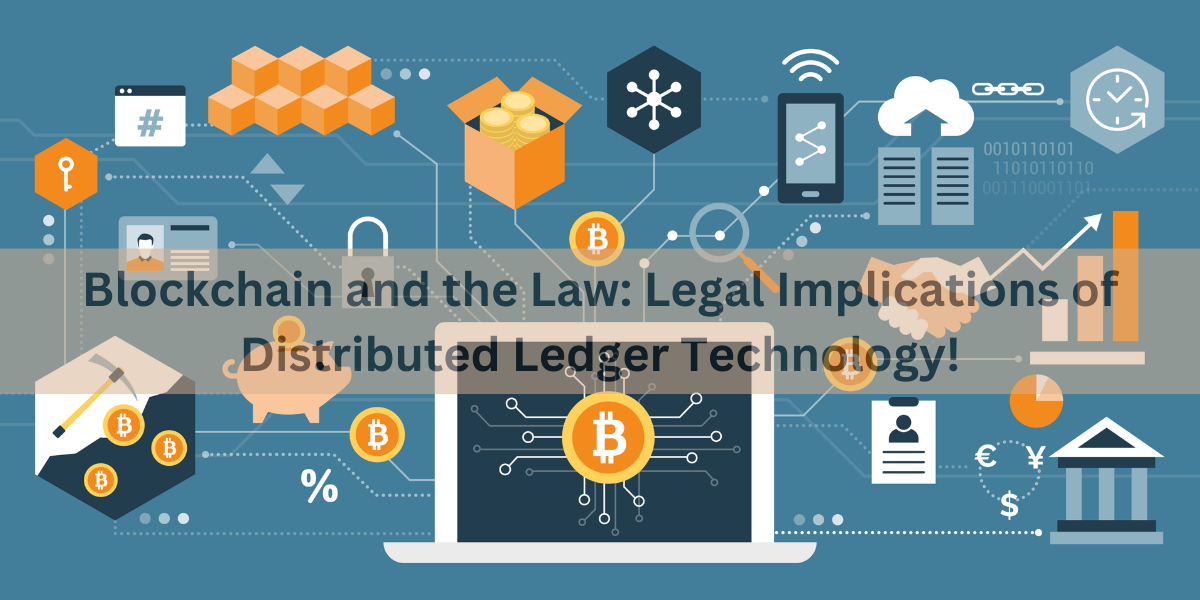Contents
- 1 Introduction to Blockchain and Distributed Ledger Technology (DLT)
- 2 Regulatory Landscape for Blockchain
- 3 Legal Status of Cryptocurrencies and Tokens
- 4 Smart Contracts and Enforceability
- 5 Intellectual Property Rights and Blockchain
- 6 Data Privacy and Security Concerns
- 7 Legal Liability and Governance in Decentralized Networks
- 8 Anti-Money Laundering (AML) and Know Your Customer (KYC) Compliance
- 9 The Future of Blockchain Legislation
- 10 Conclusion
Introduction to Blockchain and Distributed Ledger Technology (DLT)
Blockchain technology, a type of distributed ledger technology (DLT), has revolutionized various industries with its decentralized and immutable nature. By recording transactions across multiple computers in a way that ensures security, transparency, and efficiency, blockchain is poised to transform sectors ranging from finance to supply chain management. However, with these advancements come complex legal implications that require thorough examination and understanding.
Regulatory Landscape for Blockchain
The regulatory environment for blockchain varies significantly across different jurisdictions. While some countries like Malta and Switzerland have embraced blockchain with favorable regulations, others, including China and India, have imposed stringent restrictions. In the United States, the regulatory approach is fragmented, with various federal and state agencies offering differing perspectives. Navigating this complex regulatory landscape is crucial for businesses and developers involved in blockchain projects.
Legal Status of Cryptocurrencies and Tokens
Cryptocurrencies, a prominent application of blockchain technology, face varied legal statuses worldwide. Regulatory bodies such as the Securities and Exchange Commission (SEC) in the United States categorize some tokens as securities, subjecting them to rigorous compliance requirements. Legal classifications affect how cryptocurrencies can be traded, taxed, and utilized, influencing their adoption and market dynamics.
Smart Contracts and Enforceability
Smart contracts, self-executing contracts with terms directly written into code, present unique legal challenges. While they offer efficiency and reduced transaction costs, questions arise regarding their enforceability under current legal frameworks. Issues such as jurisdiction, interpretation of code as law, and dispute resolution mechanisms need to be addressed to integrate smart contracts seamlessly into the legal system.
Intellectual Property Rights and Blockchain
Blockchain technology also impacts intellectual property (IP) law. The immutable nature of blockchain can be used to establish proof of ownership and timestamp IP assets, offering enhanced protection against infringement. However, the decentralized nature of blockchain poses challenges in enforcing IP rights, necessitating new legal approaches and frameworks.
Data Privacy and Security Concerns
The General Data Protection Regulation (GDPR) and other data privacy laws present significant challenges for blockchain technology. The inherent transparency and immutability of blockchain conflict with the right to be forgotten and other privacy rights. Legal experts and technologists must collaborate to develop solutions that balance blockchain’s benefits with data privacy requirements.
Legal Liability and Governance in Decentralized Networks
Determining legal liability in decentralized networks is complex. Traditional legal systems are based on centralized entities, whereas blockchain operates on peer-to-peer networks without a central authority. Issues such as liability for fraudulent transactions, governance mechanisms, and accountability need careful consideration to ensure legal compliance and protection for users.
Anti-Money Laundering (AML) and Know Your Customer (KYC) Compliance
Blockchain’s anonymity features raise concerns about money laundering and terrorist financing. Regulatory authorities worldwide are implementing stringent Anti-Money Laundering (AML) and Know Your Customer (KYC) requirements for blockchain-based businesses. Compliance with these regulations is essential to mitigate legal risks and foster trust in blockchain technology.
The Future of Blockchain Legislation
As blockchain technology continues to evolve, so will its legal implications. Governments and regulatory bodies are actively exploring ways to adapt existing laws and create new frameworks to address the unique challenges posed by blockchain. Ongoing collaboration between technologists, legal experts, and policymakers will be crucial in shaping a balanced and effective regulatory landscape.
Conclusion
Blockchain technology holds immense potential to revolutionize various industries, but its legal implications are complex and multifaceted. Understanding and navigating the regulatory landscape, addressing issues related to smart contracts, IP rights, data privacy, legal liability, and compliance are essential for the sustainable growth of blockchain. As the technology advances, continuous dialogue and collaboration among stakeholders will be vital in ensuring that blockchain can achieve its full potential while adhering to legal standards and protections.













































